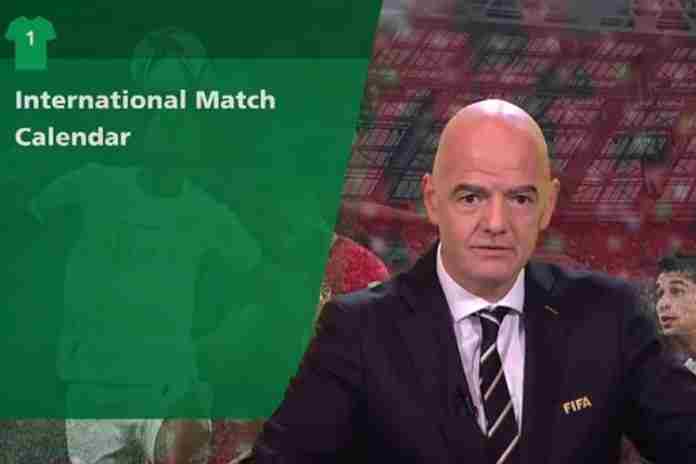Already the wealthiest of the International Federations, FIFA had a busy 71st Congress, held online last Friday (21st), taking several interesting decisions with an eye to expanding its global impact and reach:
● The selection of future hosts for the FIFA Women’s World Cup will be decided by the full Congress in the future, not the FIFA Council. This places the women’s event on the same platform as for the men’s World Cup.
● A Saudi proposal was approved to conduct a feasibility study on holding the FIFA World Cup and FIFA Women’s World Cup every two years instead of every four.
FIFA President Gianni Infantino (SUI) told reporters afterwards that the study must consider how to make the World Cup more global, in order to encourage further investment at the national level for countries which are not consistent World Cup qualifiers in both the men’s and women’s tournaments:
“Are we really convinced that playing qualifying games in September, October, November, March, June, September, October, November, March for a competition which takes place in June the second year – whether it’s the Euro or the World Cup, or Copa America or the World Cup, it doesn’t really matter – do we really think this is the right way for football, when we are saying, ‘fans, maybe they want more meaningful games, less meaningless games.’ So all of these points have to be considered.”
● A Jamaican proposal was approved for a comprehensive consultation on the “opportunities for women’s global competitions, including a women’s world league.”
● A Liberian proposal was approved for a review and a new proposal for FIFA youth competitions (the U-17 and U-20 World Cups, and others), including age categories, the number and type of events and the qualifying procedures, with an eye to better future development paths for players.
Infantino’s 45-minute opening address listed 11 areas for future action, including:
(1) The international match calendar: “How many matches can a player play per year? How many competitions do we want or do we need? And what kind of competitions? Do we play too much? Or don’t we play enough, maybe, in some parts of the world? Do we want more games, or do we want less, but more meaningful? And what about the intercontinental travel of players when they have to play for their national teams?” He insisted that the status quo is not a solution, and that the discussion should start from scratch.
(2) Men’s competitions: The 2026 World Cup will increase to 48 teams and the new Club World Cup will also bring new interest.
(3) Women’s competitions: From the 140 teams which participated in Women’s World Cup qualifying in 2019, more than 180 will compete for 2023. And a women’s Club World Cup is coming, part of FIFA’s promised $1 billion investment in women’s football over four years.
Infantino also noted that the women’s World Cup television and sponsorship rights will be sold separately in the future, not as part of a package with the men’s World Cup: “We will commercialize women’s football independently. We are not going any more to our broadcasters and sponsors and tell them, ‘you want to buy the men’s World Cup, we give you in addition the women’s as well.’ These times are over. Gone.”
(4) Youth competitions: Should these be yearly, to offer the greatest possible opportunities to young players, or every other year as is done now?
(5) Financial regulations: Especially in the area of player transfers, with better transparency on payments. Caps on transfer fees, on salaries and the like should be considered. A clearinghouse to assure that clubs which are training future stars – which receive about 1% of the total transfer fees now – are properly compensated will be set up.
(6) Laws of the Game: Continued focus on the offside rule, especially in the era of replay, to encourage more offense. More substitutions to allow for player health are also coming, perhaps also adding a special substitution opportunity for concussions.
(7) Football development: FIFA has poured $1.75 billion U.S. in this area for the 2019-22 period, five times more than from 2011-14, and more is coming.
(8) Technical development: More player development programs are promised, as well as much more development of referees in a professional capacity, especially those who work with professional leagues.
(9) Social role of football: Infantino emphasized “zero tolerance on discrimination” calling racism “another virus, and football, sadly, is not immune.” He added, “We will continue to educate, but we will also sanction – very harshly – because it is intolerable.” He also noted that FIFA has had some success in pushing for human rights, and stated that the 2022 World Cup in Qatar will leave a positive social legacy there. Infantino also voiced concerns about protecting children playing sports and would like to see an international organization which can help.
He also expressed concern about match integrity; he said around 0.4% of games each year (about 140), showed some suspicious activity. FIFA is working with the international organizations, including branches of the U.N. on this.
(10) Fans: What can FIFA do for football’s five billion fans, “something with which he can live his passion”?
(11) Digital: Joining the global appeal of football and the new communications opportunities could be a powerful accelerator for the sport. A “new digital FIFA venture” is promised soon.
He also noted FIFA’s payment of $1.5 billion in Covid support payments to national federations, made from FIFA’s reserves (he pointedly stated, “in FIFA, money does not evaporate any more”).
On FIFA’s responsibilities, he said: “Article 2 of our statutes – you should read it once – says that it is our duty to improve the game of football and to promote it globally. And it is also our duty to organize our own international competitions.
“Our competitions are your competitions, because you are FIFA. And in whatever we do, we always have to think about the fans, we always have to think about the countries – all the countries in the world – and we always have to think about the players.
“We are at the service of football. We are not the protagonists of football. We have to set the scene for the players to shine, and for the fans to enjoy, to live football with passion. We have to know what our job is.”
In this area, Infantino stated he wants to see 50 “top” national teams worldwide and 50 top club teams worldwide, in both men’s and women’s football. Even with FIFA’s resources, that will take some doing. He noted that the top 30 clubs in terms of annual revenue are all European, the top 20 are in just five European countries, and that the trend is toward imbalance rather than parity. He said that has to change.
With the payments to the national associations alone, Infantino could have claimed plenty of credit and would have received it at the Congress. But he has ideas, has welcomed ideas from others and wants to do more; it will be fascinating to see what grows from the 11 seeds he planted.
You can receive our exclusive TSX Report by e-mail by clicking here. You can also refer a friend by clicking here, and can donate here to keep this site going.
For our updated – as of 1 May – 506-event International Sports Calendar for 2021 and beyond, by date and by sport, click here!




























